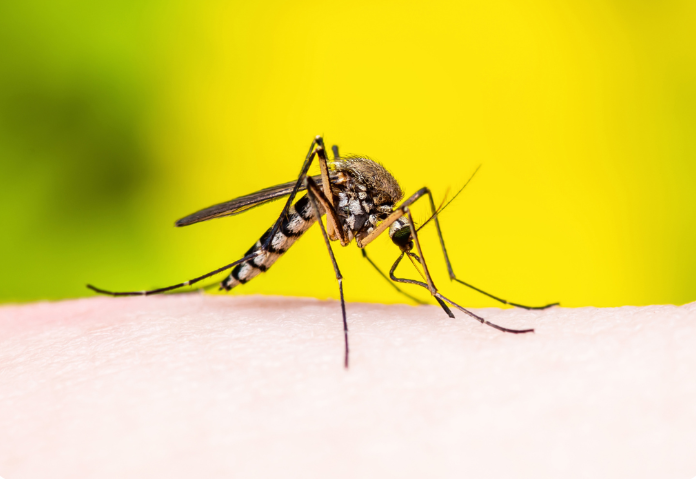

Çfarë është ethet e verdha?
Ethet e verdha (ethet e verdha) është një sëmundje akute hemorragjike e shkaktuar nga virusi Viscerophilus tropicus nga familja flavirivirus .
Si mund të merrni ethet e verdha?
Virusi i etheve të verdha përhapet te njerëzit përmes pickimit të mushkonjave të infektuara që i përkasin gjinisë Aedes dhe Haemogogus . Mushkonjat infektohen me këtë virus kur ushqehen me gjakun e majmunëve të infektuar që jetojnë në pyjet tropikale të shiut, dhe më pas, nga ana tjetër, mund të infektojnë majmunët e tjerë dhe njerëzit përmes pickimeve. Njerëzit e infektuar me virusin ZHL, nga ana tjetër, mund të infektojnë mushkonjat brenda 5 ditëve nga shfaqja e simptomave të sëmundjes. Fatkeqësisht, infeksioni njerëzor mund të ndodhë jo vetëm si rezultat i takimeve me insektet e infektuara në pyjet tropikale të shiut, por edhe në qytete: epidemitë ndodhin kur njerëzit e infektuar nga pickimi i mushkonjave e sjellin virusin në zona me popullsi të dendur me një densitet të lartë popullsie të mushkonjave të gjinisë. Aedes dhe Haemogogus dhe me mungesë imuniteti ndaj kësaj sëmundjeje në shumicën e popullsisë . Në kushte të tilla, mushkonjat përhapin virusin nga një person te tjetri (të ashtuquajturat ethet e verdha urbane). Sëmundja nuk përhapet përmes kontaktit person me person.
Në cilat vende mund të infektoheni me virusin e etheve të verdha?
Virusi i etheve të verdha mund të infektohet në zonat tropikale dhe subtropikale të Amerikës së Jugut dhe Afrikës. Lista e vendeve ku është regjistruar transmetimi i virusit të etheve të verdha mund të gjendet këtu .
Sa shpejt pas infektimit do të shfaqen simptomat e para të sëmundjes?
Periudha e inkubacionit (koha nga infektimi deri në manifestimet e para të sëmundjes) është 3-6 ditë.
Cilat janë simptomat e sëmundjes?
Sëmundja mund të jetë asimptomatike, por nëse shfaqen simptoma, më të zakonshmet janë ethe, të dridhura, dhimbje koke intensive, dhimbje shpine, dhimbje muskulore, nauze dhe të vjella, lodhje dhe dobësi. Shumica e pacientëve shërohen nga këto simptoma në rreth 3-4 ditë. Megjithatë, rreth 15% e njerëzve zhvillojnë një formë më të rëndë të etheve të verdha pas një lehtësimi të përkohshëm që zgjat nga disa orë në një ditë. Në raste të tilla, pacienti zhvillon ethe të rënda, verdhëz (zverdhje e lëkurës dhe sklerës së syrit, për shkak të së cilës sëmundja mori emrin ethe "e verdhë"), delirium (delirium), konvulsione, gjakderdhje (nga sytë. goja, hunda ose trakti gastrointestinal). Kjo gjendje mund të çojë në goditje infektive-toksike dhe dështim të mëlçisë dhe veshkave. Përafërsisht 20 deri në 50% e njerëzve që zhvillojnë një formë të rëndë të sëmundjes vdesin.
Si ta trajtojmë sëmundjen?
Nuk ka trajtim specifik për ethet e verdha. Nëse është e mundur, pacienti duhet të shtrohet në spital për lehtësim simptomatik dhe vëzhgim. Pushimi, rihidrimi (parandalimi i dehidrimit) dhe përdorimi i qetësuesve të dhimbjes dhe antipiretikëve mund të lehtësojnë simptomat. Disa medikamente, si aspirina ose medikamente të tjera anti-inflamatore josteroide (si ibuprofeni dhe naprokseni), duhet të shmangen sepse rrisin rrezikun e gjakderdhjes.
Si të mbroheni nga ethet e verdha?
Ethet e verdha mund të parandalohen me një vaksinë shumë efektive që është e sigurt, e përballueshme dhe që është përdorur në mbarë botën për më shumë se 80 vjet. Në shumicën e rasteve, një dozë është e mjaftueshme për të krijuar mbrojtje gjatë gjithë jetës kundër sëmundjes. Pas futjes së vaksinës, një përgjigje adekuate imune formohet në 80-100% të të vaksinuarve në 10 ditë dhe në 99% të vaksinuarve - në 30 ditë. Gjithashtu nuk duhet të harroni metodat e tjera të mbrojtjes nga pickimi i insekteve: repelentët dhe rrobat që mbulojnë trupin sa më shumë që të jetë e mundur. Përdorimi i rrjetave kundër mushkonjave në shtrat ka efektivitet të kufizuar sepse disa mushkonja që bartin virusin ZL janë aktive gjatë ditës.
A është e mundur të vaksinoheni kundër etheve të verdha në Ukrainë?
Në Ukrainë, vaksina Stamaryl është e regjistruar për parandalimin e etheve të verdha. Të rriturve dhe fëmijëve të moshës 9 muajsh e lart u jepet një dozë vaksine (0,5 ml). Vaksina duhet të përdoret të paktën 10 ditë përpara vizitës në një zonë endemike për të formuar një përgjigje adekuate imune. Vaksinimi për parandalimin e VL nuk është përfshirë në Kalendarin Kombëtar të Vaksinimit, kështu që nëse është e nevojshme, mund të kryhet me shpenzimet tuaja.
Përpara se të udhëtoni në cilat vende duhet të vaksinoheni kundër etheve të verdha?
Ju duhet të vaksinoheni kundër etheve të verdha përpara se të udhëtoni në vende (ose rajone të caktuara të vendeve të caktuara) ku virusi i etheve të verdha është endemik . Gjithashtu, disa vende kërkojnë konfirmim dokumentar të vaksinimit kundër tërbimit për të hyrë në territorin e tyre (ky informacion duhet të sqarohet në faqen zyrtare të një vendi të caktuar në fazën e planifikimit të udhëtimit, sepse kërkesat për hyrje ndryshojnë periodikisht; ju gjithashtu mund të përdorni shërbimin nga Ministria e Punëve të Jashtme të Ukrainës). Vaksinimi duhet të bëhet jo më vonë se 10 ditë para udhëtimit, në mënyrë që të keni kohë për të zhvilluar imunitet ndaj etheve të verdha.
Cilat janë veçoritë e vaksinimit kundër etheve të verdha?
Vaksina kundër etheve të verdha është një vaksinë e gjallë e atenuar, ndaj para se të merret një vendim për vaksinimin, është e nevojshme të merren parasysh kundërindikimet absolute dhe të përkohshme për futjen e vaksinave të gjalla, të cilat janë të detajuara në urdhrin e Ministrisë së Shëndetësisë Nr. 2070 . Sipas urdhrit, administrimi i vaksinave të gjalla është kundërindikuar:
gratë shtatzëna;
pacientët me një nivel të lartë imunosupresioni (shih pikën 5.6 të Urdhrit );
pacientët me disa lloje të mungesës së imunitetit parësor (shih pikën 5.7 të Urdhrit );
personat pas transplantimit të organeve.
